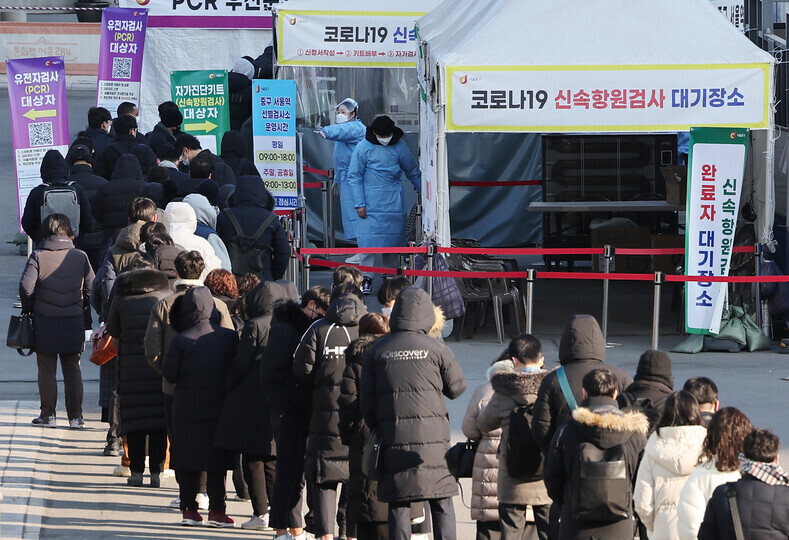hankyoreh
Links to other country sites 다른 나라 사이트 링크
S. Korea opts to ease virus curbs despite cases soaring above 100,000

Amid record-shattering COVID-19 case numbers, the South Korean government announced adjustments to its social distancing measures on Friday. Private gatherings will remain capped at six participants, but the 9 pm curfew on business hours for cafes and restaurants will be extended to 10 pm. The changes will go into effect on Saturday.
Small business owners have been demanding the closing time restrictions be lifted while health authorities are proceeding with caution amid record COVID-19 cases in the country.
Official tallies of COVID-19 cases on Thursday, announced Friday morning by the Ministry of Health and Welfare, reached 109,831 — exceeding 100,000 for the first time since the start of the pandemic.
On Wednesday, the number of new cases stood at 93,135 with 389 in serious or critical conditions. It marked the first time that the number of critically ill patients has increased by 76 or more in a day since the end of March 2020, when related statistics first started to be compiled. The number of people undergoing at-home treatment also increased by 48,525 in a single day to reach 314,565.
Son Yong-rae, head of social strategy at the Central Disaster Management Headquarters, said at a briefing Thursday, “The rate of increase in severely ill patients has slowed significantly compared to the Delta [variant].” He added, “We are more than capable of handling up to 1,500-2,000 [critical] cases.”
In a phone call with the Hankyoreh, another government official said, “We are thinking about whether more flexible disease prevention measures are necessary considering the characteristics of Omicron."
At a meeting of the government’s New Normal Recovery Support Committee held Thursday, opinions were sharply divided on whether to ease social distancing measures.
Roh Kwang-pyo, a member of the economic and people's livelihood division of the committee and head of the Korea Employment and Labor Educational Institute said, "Small business owners have demanded that the limit on business hours be completely removed. But the government maintains that it can’t go that far.”
“I think there is a high level of fatigue [related to the social distancing measures], so it appears that the government will ease some of these restrictions,” Roh added. “Small business owners have demanded that the government draw up a roadmap for returning to normal by forecasting trends in the pandemic over the next two to three months.”
But health authorities are urging that more caution be taken when discussing the easing of social distancing measures. Yoon Tae-ho, a professor of preventive medicine at Pusan National University’s school of medicine, says, “Instead of the number of hospital beds available or the number of critically ill patients, problems are more likely to arise in ensuring the stability of essential social services, such as [a lack of] healthcare personnel.”
“Considering this, it is reasonable to maintain the current level [of distancing measures] until the number of confirmed cases reaches its peak,” Yoon noted.
The government's concerns are also deepening out of a fear that Korea could see a repeat of what happened in November of 2021. At the time, the government moved to ease social distancing measures but failed to take into account the fact that older populations’ immunity from vaccines was rapidly declining. The policy did not have its desired effects and led to a paralysis of the medical system.
For this reason, while it seemed likely that the government would opt to increase the number of people allowed at private gatherings to eight and extend business hours to 10 pm, it seemed to reach a compromise by keeping the cap on private gatherings while extending business hours.
By Kwon Ji-dam and Lim Jae-hee, staff reporters
Please direct questions or comments to [english@hani.co.kr]

Editorial・opinion
![[Editorial] Intensifying US-China rivalry means Seoul must address uncertainty with Beijing sooner than later [Editorial] Intensifying US-China rivalry means Seoul must address uncertainty with Beijing sooner than later](https://flexible.img.hani.co.kr/flexible/normal/500/300/imgdb/original/2024/0517/8117159322045222.jpg) [Editorial] Intensifying US-China rivalry means Seoul must address uncertainty with Beijing sooner than later
[Editorial] Intensifying US-China rivalry means Seoul must address uncertainty with Beijing sooner than later![[Column] When ‘fairness’ means hate and violence [Column] When ‘fairness’ means hate and violence](https://flexible.img.hani.co.kr/flexible/normal/500/300/imgdb/original/2024/0516/7417158465908824.jpg) [Column] When ‘fairness’ means hate and violence
[Column] When ‘fairness’ means hate and violence- [Editorial] Yoon must stop abusing authority to shield himself from investigation
- [Column] US troop withdrawal from Korea could be the Acheson Line all over
- [Column] How to win back readers who’ve turned to YouTube for news
- [Column] Welcome to the president’s pity party
- [Editorial] Korea must respond firmly to Japan’s attempt to usurp Line
- [Editorial] Transfers of prosecutors investigating Korea’s first lady send chilling message
- [Column] Will Seoul’s ties with Moscow really recover on their own?
- [Column] Samsung’s ‘lost decade’ and Lee Jae-yong’s mismatched chopsticks
Most viewed articles
- 1Celine Song says she’s gratified global audiences have responded to the kismet of ‘inyeon’
- 2[Editorial] Transfers of prosecutors investigating Korea’s first lady send chilling message
- 3[Exclusive] Unearthed memo suggests Gwangju Uprising missing may have been cremated
- 4[Column] US troop withdrawal from Korea could be the Acheson Line all over
- 5For new generation of Chinese artists, discontent is disobedience
- 6Xi, Putin ‘oppose acts of military intimidation’ against N. Korea by US in joint statement
- 7Highly educated high-earners at risk of being replaced by AI, BOK study says
- 8Could Korea’s Naver lose control of Line to Japan?
- 9[Editorial] Intensifying US-China rivalry means Seoul must address uncertainty with Beijing sooner t
- 10Japan begins dumping irradiated Fukushima water amid outpouring of concern about vague timeline